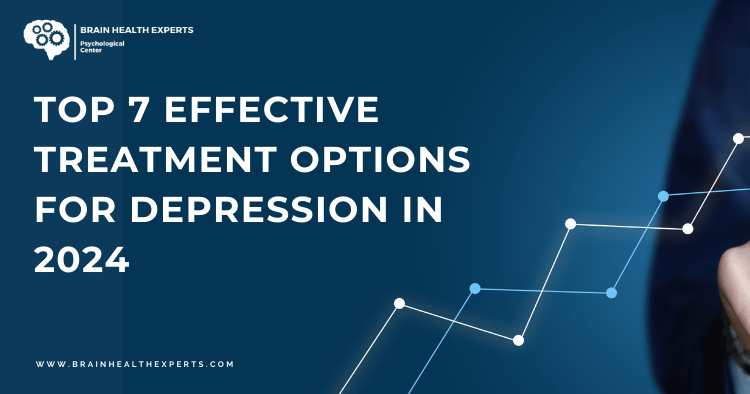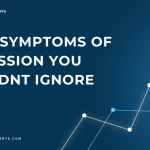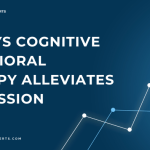Table of Contents
- Introduction
- 1. Psychotherapy
- 2. Medication
- 3. Lifestyle Changes
- 4. Mindfulness and Meditation
- 5. Exercise
- 6. Support Groups
- 7. Alternative Therapies
- Conclusion
- FAQs
Introduction
Depression is a complex mental health condition that affects millions of people worldwide. In 2024, the treatment landscape for depression continues to evolve, offering a variety of effective options tailored to individual needs. This article explores the top seven treatment options for depression, providing insights into what works best and how you can incorporate these strategies into your treatment plan. For those interested in the power of positivity in managing mental health, check out 10 Ways Positive Thinking Boosts Emotional Well-Being.
1. Psychotherapy
Psychotherapy, or talk therapy, is a cornerstone in the treatment of depression. It involves working with a trained mental health professional to explore thoughts, feelings, and behaviors. Several types of psychotherapy have been proven effective:
- Cognitive Behavioral Therapy (CBT): This popular form of therapy helps individuals identify and change negative thought patterns. For more on CBT techniques, see 10 Effective CBT Techniques to Overcome Anxiety Today.
- Interpersonal Therapy (IPT): Focuses on improving interpersonal relationships and social functioning.
- Dialectical Behavior Therapy (DBT): Particularly useful for those with intense emotions, DBT helps individuals develop skills to manage their feelings.
Psychotherapy provides a safe space for individuals to express their feelings and develop coping strategies.
Benefits of Psychotherapy:
- Provides a safe space to express feelings.
- Helps develop coping strategies.
- Can be conducted individually, with a partner, or in a group setting.
For more information on psychotherapy, visit the American Psychological Association.
2. Medication
Antidepressants are commonly prescribed to manage symptoms of depression. They work by balancing chemicals in the brain that affect mood. Here are some of the main categories of antidepressants:
| Type | Examples | How They Work |
|---|---|---|
| Selective Serotonin Reuptake Inhibitors (SSRIs) | Fluoxetine (Prozac), Sertraline (Zoloft) | Increase serotonin levels in the brain |
| Serotonin-Norepinephrine Reuptake Inhibitors (SNRIs) | Venlafaxine (Effexor), Duloxetine (Cymbalta) | Increase both serotonin and norepinephrine levels |
| Tricyclic Antidepressants (TCAs) | Amitriptyline, Nortriptyline | Affect several neurotransmitters |
| Monoamine Oxidase Inhibitors (MAOIs) | Phenelzine (Nardil), Tranylcypromine | Prevent breakdown of neurotransmitters |
Finding the right medication may require some trial and error; it’s crucial to discuss side effects with your doctor.
Important Considerations:
- Medication can take several weeks to start working.
- Side effects vary between individuals; it’s crucial to discuss these with your doctor.
- Finding the right medication may require some trial and error.
For more detailed information on antidepressants, check out the National Institute of Mental Health.
3. Lifestyle Changes
Making positive lifestyle changes can significantly impact your mental health. Here are some effective strategies:
- Balanced Diet: Nutritional psychiatry is emerging as a vital area of research. Foods rich in omega-3 fatty acids, whole grains, and antioxidants can boost mood. For further insights, see 10 Ways Positive Thinking Boosts Physical Health.
- Sleep Hygiene: Establishing a regular sleep schedule and creating a restful environment can improve overall well-being.
- Limit Alcohol and Caffeine: Both substances can exacerbate anxiety and depression symptoms.
Small changes, like incorporating more fruits and vegetables into your meals, can have a significant effect on your mood and overall health.
Why Lifestyle Changes Matter:
- They promote overall physical health, which is closely linked to mental health.
- Small changes, like incorporating fruits and vegetables into meals, can have a big effect.
4. Mindfulness and Meditation
Mindfulness and meditation practices have gained popularity as effective tools for managing depression. These techniques help individuals focus on the present moment, reducing stress and anxiety. For mindfulness exercises, consider 10 Essential Mindfulness Practices for Beginners.
Types of Mindfulness Practices:
- Mindfulness Meditation: Involves sitting quietly and paying attention to thoughts, sounds, the sensations of breathing, or parts of the body.
- Guided Imagery: Uses visualization to promote relaxation and reduce stress.
- Yoga: Combines physical postures, breathing exercises, and meditation.
Practicing mindfulness has been shown to improve emotional regulation and enhance overall mental clarity.
Benefits of Mindfulness:
- Reduces stress and anxiety.
- Improves emotional regulation.
- Enhances overall mental clarity.
For guided mindfulness exercises, check out Headspace.
5. Exercise
Physical activity is a powerful antidote to depression. Regular exercise can enhance mood by increasing the production of endorphins, the body’s natural feel-good chemicals. To learn more about stress management through exercise, visit 10 Effective Stress Management Techniques for Daily Relief.
Recommendations:
- Aim for at least 150 minutes of moderate aerobic activity or 75 minutes of vigorous activity each week.
- Activities can include walking, running, swimming, or cycling.
Engaging in regular physical activity provides a sense of achievement and can significantly improve self-esteem.
Why Exercise Works:
- It promotes social interaction when done in groups.
- It provides a sense of achievement and can improve self-esteem.
For more insights into the benefits of exercise on mental health, visit Mental Health America.
6. Support Groups
Connecting with others who are experiencing similar challenges can be incredibly beneficial. Support groups provide a platform for sharing experiences, learning from others, and gaining encouragement. For insights into the power of support in mental health, see 10 Ways Positive Thinking Fuels Personal Growth Journey.
Types of Support Groups:
- In-Person Groups: Offer face-to-face interaction and community.
- Online Support Groups: Accessible from anywhere, providing anonymity and convenience.
Support groups can reduce feelings of isolation and encourage individuals to share coping strategies.
Benefits:
- Reduces feelings of isolation.
- Encourages individuals to share coping strategies.
- Provides a sense of belonging.
For a comprehensive listing of support groups, consider visiting the Depression and Bipolar Support Alliance.
7. Alternative Therapies
Alternative therapies can complement traditional treatments for depression. These may include:
- Acupuncture: Some studies suggest it can help alleviate depressive symptoms.
- Herbal Remedies: St. John’s Wort is one of the most researched herbal treatments for mild to moderate depression. However, always consult a healthcare provider before starting any herbal regimen.
- Light Therapy: Particularly effective for Seasonal Affective Disorder (SAD), light therapy involves exposure to bright light that mimics natural sunlight.
Always consult with a healthcare professional before starting any alternative therapies, as they may interact with conventional treatments.
Important Note:
Always consult with a healthcare professional before starting any alternative therapies, as they may interact with conventional treatments.
Conclusion
Depression is a multifaceted condition that requires a personalized approach to treatment. The options outlined above represent some of the most effective strategies available in 2024. Whether you choose psychotherapy, medication, lifestyle changes, or alternative therapies, the key is to find what works best for you and seek support when needed. Remember, you are not alone in this journey, and help is always available. For more inspiration, you might also want to explore 10 Inspiring Stories That Showcase the Power of Positivity.
FAQs
1. How long does it take for depression treatments to work?
The time frame varies depending on the treatment type. Medications may take several weeks to show effects, while psychotherapy can provide quicker relief.
2. Can I combine different treatment options?
Yes, many people find that a combination of treatments, such





